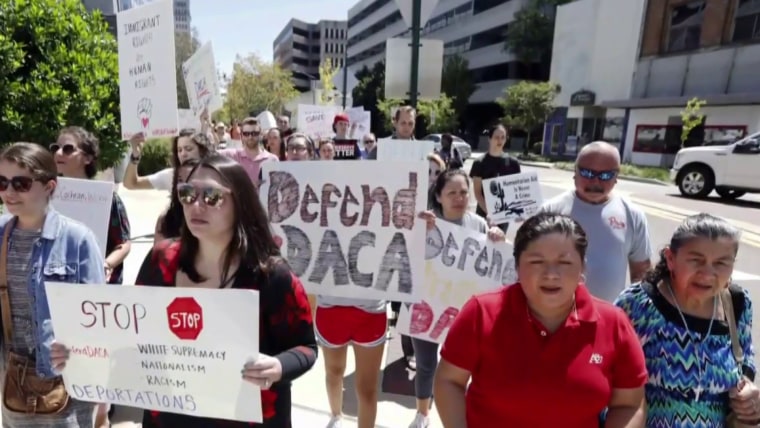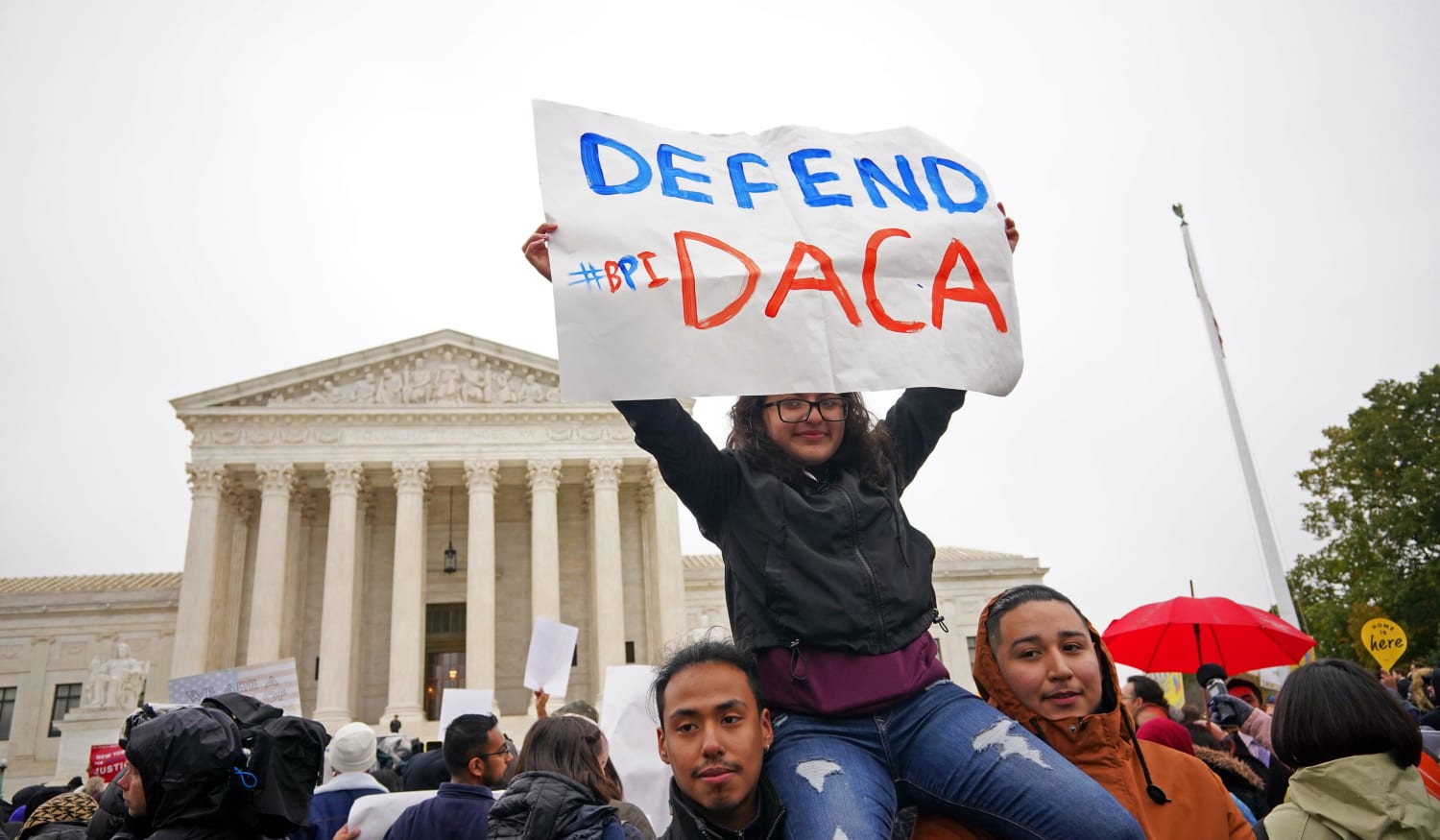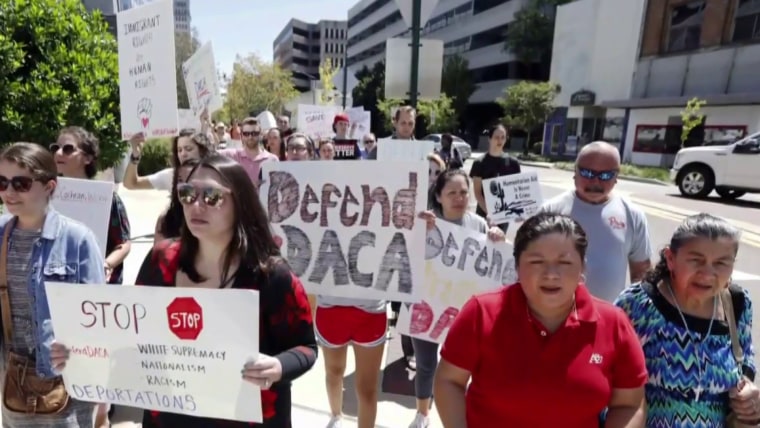Current and former DACA recipients said Thursday they “can’t help but feel déjà vu” after a federal judge in Texas again ruled against the Deferred Action for Childhood Arrivals program, which has allowed eligible undocumented young adults who came to the U.S. as children to work and study without fear of deportation.
U.S. District Judge Andrew Hanen ruled Wednesday night that recent efforts by the Biden administration to turn the Obama-era program into a federal regulation were unlawful.
The ruling was “deeply upsetting,” Areli Hernandez, a longtime DACA recipient from Los Angeles and the director of executive affairs at the immigrant rights organization CHIRLA, said at a news briefing Thursday organized by several immigrant and civil rights groups.
Former DACA recipient Bruna Sollod, a senior political director at United We Dream, the country’s largest immigrant youth-led organization, said: “Imagine hundreds of thousands of young people who have jobs right now, have mortgages, car payments, small businesses and clients that rely on them. That has a huge impact on the economy and on communities across this country.”
“I don’t know what else we need to say to make elected officials and the Biden administration understand the threat that we are facing,” Sollod said.
The program’s fate is still uncertain as the six-year court battle continues to play out in courts after legal challenges from the Trump administration and nine Republican-led states seeking to fully end DACA.
Here are four important things to know about who is affected and what’s at stake.
Does this actually mean DACA is illegal?
Technically, yes. But that doesn’t mean DACA has ended.
While the roughly 580,000 current recipients can continue to renew their DACA status every two years, the program is closed for new applicants.
While Hanen, whom President George W. Bush nominated in 2002, has ruled DACA illegal multiple times, he has refrained from fully terminating it.
The latest ruling “continues to allow DACA recipients to file renewal applications while the case is pending appeal,” said Andrea Senteno, the regional counsel at the Mexican American Legal Defense and Educational Fund, better known as MALDEF.
MALDEF has been representing 22 DACA recipients since 2018 in the legal challenge brought by the Republican-led states of Alabama, Arkansas, Kansas, Louisiana, Mississippi, Nebraska, South Carolina, Texas and West Virginia.
Alongside attorneys from the federal government and New Jersey, MALDEF has argued that the states have “failed to prove injuries from DACA’s implementation and that the initiative is a lawful exercise of presidential discretion,” Senteno said.
In 2020, the Supreme Court ruled 5-4 that the Trump administration improperly ended DACA in 2017, allowing it to stay in place.
Will DACA recipients lose their status?
They won’t lose their status as long as they continue to renew their DACA in a timely manner.
Current recipients or those whose DACA status expired less than a year ago can continue to renew it every two years. Those who miss the window to renew would be able to reapply only as new applicants — but that isn’t currently allowed.
“Sometimes people fall out of the DACA status because they don’t renew on time due to finances or due to the inability to access the correct legal resources,” Hernandez said. “Unfortunately, this decision from Judge Hanen also affects those who were not able to renew their DACA with sufficient time.”
Who’s left out?
An estimated 400,000 people who would have been eligible to apply for the first time haven’t had access to DACA since 2021, according to an analysis by FWD.us, a bipartisan group supporting immigration reform.
Among the 400,000 people shut out of the DACA program are nearly 93,000 first-time applicants who have been left in limbo for the past two years. They had submitted the necessary paperwork and paid the required $495 fee to apply for the program shortly before Hanen closed it for new applicants.
Since DACA started in 2012, recipients have contributed $108 billion to the economy, as well as $33 billion in combined taxes, according to FWD.us.
“It strengthens our economy, our communities and provides a way for people who came as children to work, study, live their lives and support their families,” said Vanessa Cárdenas, the executive director of the immigrant advocacy organization America’s Voice.
An overwhelming majority of DACA recipients were born in Mexico, followed by other Latin American countries, according to U.S. Citizenship and Immigration Services. A smaller but significant number are from Asian countries such as the Philippines, India, Pakistan and Indonesia.
What happens next?
Hanen’s ruling is likely to be appealed to the Supreme Court, sending DACA before the court for a third time.
As of Thursday afternoon, MALDEF had no timeline for the appeals process. Senteno said it is “reviewing closely the decision and preparing and discussing what the next steps will be” alongside attorneys from the federal government and those representing plaintiffs in New Jersey.
In the meantime, DACA recipients and immigrant rights advocates have continued to push for a pathway to citizenship.
“We need a permanent solution that will recognize our humanity, our roots and our contributions to this nation,” Hernandez said.
Sen. Alex Padilla, D-Calif., introduced a bill in July that could provide permanent residency, or green cards, to more than 8 million noncitizens by updating a provision in the Immigration and Nationality Act known as registry. That would allow immigrants who have been continuously present in the U.S. for “at least 7 years” to apply for permanent residency.
A House version of the bill was introduced this year.
Glo Choi, a community organizer at HANA Center, a nonprofit group advocating for Koreans, Asian American and immigrant communities, said he believes the bills are the best option to provide legal status to DACA recipients and other kinds of undocumented immigrants.
“We believe that all of us are deserving of living free, with dignity, in the place that we call home,” Choi said.
A bill re-introduced by Rep. Sylvia Garcia, D-Texas, in June seeks to provide a pathway to citizenship for DACA recipients and other immigrants with other kinds of immigration protections.
Versions of the bill passed in the House last year and in 2021, Cárdenas said, adding it could pass it again if at least nine Republicans support it alongside Democrats.
Supporters of DACA say it’s one of the most successful policies for immigrant integration. Most DACA recipients have lived in the U.S. for more than 16 years.
“They are no longer kids. They are raising families of their own and are well into their careers,” Cárdenas said.
The average DACA recipient is 26 to 28 years old, said Gaby Pacheco, the director of advocacy, development and communications at TheDream.Us, an organization helping young immigrants complete college.
“Those who are at the top of the DACA population are now in their early 40s,” Hernandez said. “And those who are in their mid- to early 20s can’t access DACA anymore.”
DACA recipients are also parents to more than 200,000 U.S. citizen children. Among them is Angel Reyes, a DACA recipient from Long Island, who is an organizing coordinator at Make the Road New York.
“That’s what I’m thinking about the most,” Reyes said.
Without a permanent solution to regulate the immigration status of DACA recipients, Reyes fears he could be separated from his two U.S. citizen children. That fear brings him back to when he was a 17-year-old in high school and his mother was deported to Peru.
“That was one of the most difficult moments that I experienced, if not the most difficult moment I experienced in my life,” said Reyes, who is also a business owner.
Source: | This article originally belongs to Nbcnews.com











